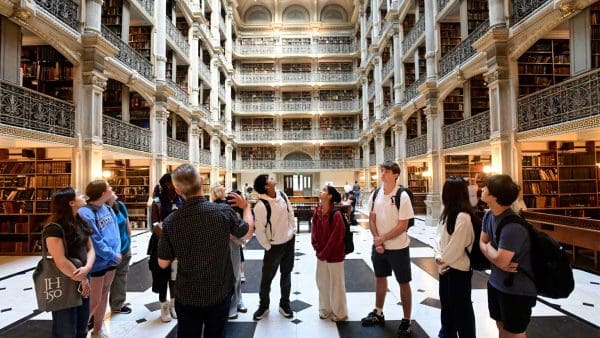In September, director James Foley posed these questions to an audience of Hopkins film and media studies students: “What is it you do better than anybody else? What is your sweet spot? What story can you tell better than anyone in the world about a given subject?” Pausing slightly, he advised, “When you find your thing you have to stick with it. The worst thing is to do something outside of your experience that you think other people want to see; then you [fail]. If it’s truthful, you’ve got to go after that.” Heady advice to aspiring filmmakers from the director of films like Glengarry Glen Ross and At Close Range, as well as several episodes of the Netflix award-winning series, House of Cards, which is filmed in and around Baltimore.
As the Film and Media Studies Program approaches both its 20th anniversary (it began as part of the English Department in 1995) and its upcoming move to the nearby Station North Arts District, slated for July 2015, it continues to grow at a dynamic pace. In 2013, the program graduated 53 majors. During the Fall 2013 semester, the program expanded its speaker series by hosting Foley and House of Cards’ writer Beau Willimon, as well as Shaka King, director of the independent film Newlyweeds.
These sorts of experiences are invaluable, says Film and Media Studies Program Director Linda DeLibero, because they give students the opportunity to learn from practitioners in the field. At Foley’s talk, students’ questions ranged from general advice to how one would characterize the relationship between the director and the screen writer to how House of Cards keeps crew members from leaking details about the new season.
In October, film and media students also planned the first Johns Hopkins Film Conference, “Expanded Cinema: Film, Technology, and Society.” The brainchild of Nour El Safoury ’13, the conference was organized and run by five film and media studies students with guidance from lecturer and video artist, Jimmy Roche. “The conference was an attempt to start a dialogue on the Homewood campus about new media and the use of digital technology in the filmmaking business,” says El Safoury. “We also wanted to explore the works of some of the non-conforming and innovative artists working in the region at the intersection of technology and cinema.” Outside participants included students from Allegheny College and the University of Maryland, as well as filmmaker Toni Dove, a pioneer in interactive cinema, and Baltimore-based practicing visual artists Alan Resnick and Margaret Rorison.
Learning from educators intimately involved in all aspects of film study and production has been a consistent hallmark of the Film and Media Studies Program. In May 2013, the program was graced with funding for two lecturers care of the Amy M. and Roger C. Faxon Fund for Practicing Artists, an endowed fund to support teaching faculty in the various disciplines of the arts. During the Fall 2013 semester, filmmaker Matthew Porterfield (Putty Hill, I Used to be Darker) taught “Producing the Independent Film” and “Directing Actors.” Screenwriter Roberto Busó-García, former manager of film programming for HBO Video, HBO Latino, and Cinemax, and founder and president of Alquimia Films, a production company that identifies emerging and established screenwriters and matches them with funding opportunities, taught “Introduction to Dramatic Writing: Film” and “Intermediate Dramatic Writing.”
DeLibero acknowledged students’ efforts to draw together a broad range of voices and create an intellectual space where important media-based questions could be addressed. “The ability of our students to know film and know culture, art, society, the history of film, theory, to fall in love with film as an art form, and to understand film’s place in the world is really important to us,” says DeLibero. “We love that our students are not only thoughtful makers of film, but that they can be scholars of film and learn from the past as well as from new technology.”




